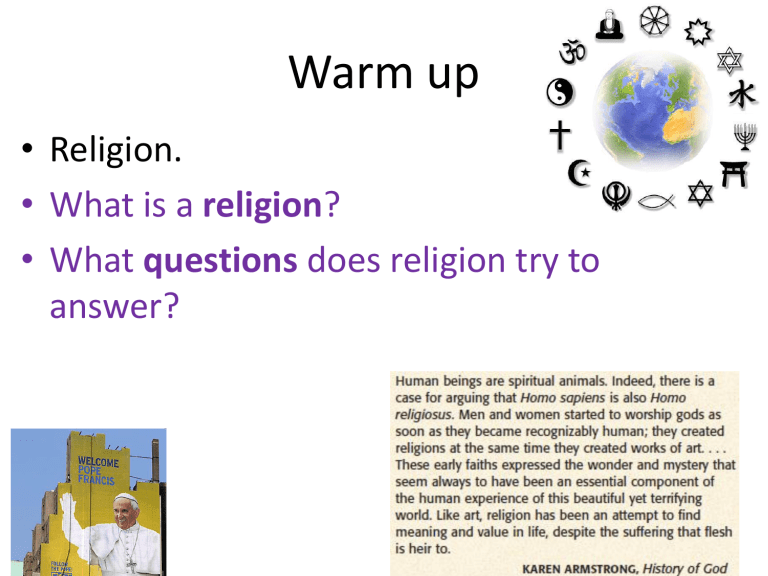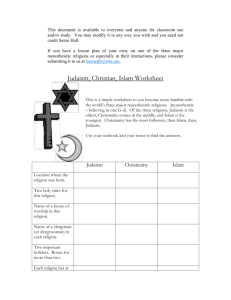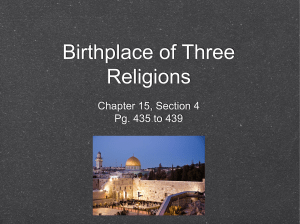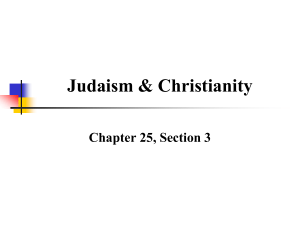Comparing the big three religions

Warm up
• Religion.
• What is a religion?
• What questions does religion try to answer?
Religious Discussions
We teach about religions.
–We will be respectful.
–We won’t speculate about Truth
• (capital T).
– Every religion tells us something about humanity.
– Every religion can look strange from outside.
Religion often includes:
• a set of beliefs and stories explaining the cause and purpose of the universe,
• A description of what happens to us when we die,
• Rituals and practices that are part of the worship of a God or gods ,
• a moral and ethical code to guide human behavior,
• An organized community of believers.
Religion Vocab
• Orthodoxyfollowing established/official teachings.
• Doctrine/DogmaOfficial teachings, beliefs.
• Blasphemyoffense of speaking sacrilegiously about God or sacred things
• Heresya belief or theory that goes against orthodoxy (established teachings).
• SchismA division within a religious group.
• Secta religious sub-group (a group w/i a group).
• Sectarian Violenceviolence inspired by religious sects
What is a “universal” or “world” religion?
• List the 5 characteristics (from your reading)
What contributed to the rise of world religions?
Let’s Compare
Population (of approximately7.125 Billion):
1. Christianity: approximately 2 billion (1)
2. Islam: approximately 1.3 billion (2)
3. Judaism: approximately 14 million (12)
Agnostic, Atheist, Non-Affiliated, Secular—1.1 billion
Hinduism—1 billion Traditional Chinese—394 million Buddhism—376 million
The Abrahamic Religions
• Judaism
• Christianity
• Islam
All come from Abraham.
All are monotheistic
All tell the story of Abraham in their holy books.
Islam
622
Followers
Qu’ran
God (Trinity)
Moses
1800 (?) BCE 33 (?) CE
Muslims
Torah
Jews
Bible (OT +
Major Area Middle East,
SE Asia USA
Sacred Text
Let’s Compare
Christianity c. 33 CE
Jesus
Qur’an
Christians
Europe, N/S
America,
Africa
Bible (OT+NT)
Clergy Imams
Bible
(Torah (5)/OT)
Rabbis
Church/State Integrated
Expansion Arabian
Peninsula (12 yrs), Atlantic-
China (100 yrs)
Separate
Little expansion, remained mostly in
Palestine
Priests,
Ministers
Separate
Major cities
(60 yrs),
Roman
Empire by 4 th
Century
The Origins of Judaism
Land and Religion
1. Why was ancient Palestine such an interesting place?
2. Where did Abraham and his family come from?
3. What is the relationship between Yahweh and the Hebrews?
4. How was Abraham’s God (Yahweh) different from other Gods?
• God promises to protect Abraham’s people from their enemies , and give them the land of Canaan (Israel).
• In return, Hebrews promise to obey God
(Yahweh)
– This is called The Covenant
(a covenant is an agreement)
The Exodus
• Later the Hebrews suffered from the failure of their crops. They moved to Egypt, but over time they were made into slaves.
• After many years, they left in a mass departure that Jews called the Exodus.
• According to the sacred book of the Jews, a man named Moses led them out of Egypt. They wandered 40 years in a wilderness.
The Second Covenant
• During that time, the story says, Moses received from God the
Ten Commandments on
Mt. Sinai.
• These were the laws that the Hebrews were to follow. For the second time, God promised to protect these people in return for their obedience to his laws.
The Ten Commandments
A new covenant for the Jewish people
Graven Image =Idol worship (worshipping a physical representation of the gods)
How are the Ten Commandments:
• Similar to Hammurabi’s code?
• Different from Hammurabi’s Code?
Comparing Hammurabi and 10
Commandments
• Similar in some respects, but strict penalties softened by God’s mercy.
• First four commandments are not specific laws but guidelines on how to live a moral life and worship God (convenant).
• Interpreted by prophets (religious teachers) who focused more on equality before the law.
Duties of the Hebrews
• The Hebrews had other leaders called prophets. They said that they were messengers sent by
God to tell the people how he wanted them to act.
• These prophets told the people that they had two duties:
1. To worship God
2. To deal in just and fair ways with each other.
Significance of Monotheism
• With monotheism, religion was changing.
• Instead of being a part of life run by priests who followed certain rituals, it was now a matter of each person living a moral life.
• The idea emerged that each individual was important and valuable to God; and God was accessible to everyone, not just the priests.
Palestine 3000 years ago:
David v. Goliath
Palestine today:
Young Palestinians v. Israel
Who said it?
“Love your enemies, do good to those who hate you, bless those who curse you, and pray for those who mistreat you.”
The Teachings of
•
Jesus
If someone takes your coat, let him have your shirt as well.
• Give to everyone who asks for something, and when someone takes what is yours, do not ask for it back.
• Do for others only what you would want them to do for you.
Jesus
• Member of the Roman
Empire.
• Firm believer in
Judaism.
• Jesus was
Jewish.
The Jewish Diaspora
70 CE-1948 CE
Who said it?
“Love your enemies, do good to those who hate you, bless those who curse you, and pray for those who mistreat you.”
Jesus and the Romans
Why do you think that the Romans felt
threatened by this
poor carpenter?
From a Roman perspective, why did
Jesus have to die?
• Because he disturbed Roman order.
• Because he spoke seditiously of a coming kingdom other than that of Caesar.
• Because he allowed himself to be called “King of the Jews.”
• Because he made a nuisance of himself at the wrong time
(Passover), in the wrong place (Jerusalem), in the presence of the wrong people (Pilate and the temple leadership under his command).
• Because his crucifixion would be a powerful deterrent that might keep other Jews from following in his footsteps.
http://www.patheos.com/blogs/markdroberts/series/why-did-jesus-have-to-die/
The Crucifixion of Jesus
Common form of torture and capital punishment used by the Roman Empire.
INRI-
"Iesvs Nazarenvs Rex
Ivdaeorvm."
“Jesus of Nazareth,
King of the Jews”
Paul and Constantine
• How does Paul advance Christianity?
• How does Constantine advance
Christianity?
• What is the Edict of Milan?
• What is the Council of Nicea?
Saint Paul
Preached that anybody could become a Christian, not just Jews.
Spread the Gospel of
Christianity throughout the
Roman Empire.
Christianity: a universal religion.
Hard Power and Soft Power
• Hard Power : The use of physical force and economic threats to change people’s behavior.
• Soft Power : The ability to attract people to your idea without force, to get them to change their behavior willingly through persuasion.
Thesis Statements (with two pieces of evidence for each)
• Which type of power explains the survival and spread of Christianity ?
Rise and spread of
Islam
• What are the
Five pillars of Islam
– Faith
– Prayer
– Alms
– Fasting
– Pilgrimage
– Do these remind you of anything else we have seen?
Islam, Christianity and Judaism
• How did Muslims treat Jews and
Christians in the areas that they conquered?
Let’s Compare








